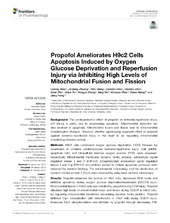| dc.contributor.author | Zhao, Lidong | en_US |
| dc.contributor.author | Zhuang, Jinqiang | en_US |
| dc.contributor.author | Wang, Yihui | en_US |
| dc.contributor.author | Zhou, Dandan | en_US |
| dc.contributor.author | Zhao, Dandan | en_US |
| dc.contributor.author | Zhu, Shun | en_US |
| dc.contributor.author | Pu, Jinjun | en_US |
| dc.contributor.author | Zhang, Hongyu | en_US |
| dc.contributor.author | Yin, Ming | en_US |
| dc.contributor.author | Zhao, Wenjuan | en_US |
| dc.contributor.author | Wang, Zejian | en_US |
| dc.contributor.author | Hong, Jiang | en_US |
| dc.date.accessioned | 2020-05-14T14:42:20Z | |
| dc.date.available | 2020-05-14T14:42:20Z | |
| dc.date.issued | 2019-02-12 | |
| dc.Published | Zhao L, Zhuang J, Wang Y, Zhou D, Zhao D, Zhu S, Pu J, Zhang H, Yin M, Zhao, Wang Z, Hong J. Propofol ameliorates H9c2 cells apoptosis induced by oxygen glucose deprivation and reperfusion injury via inhibiting high levels of mitochondrial fusion and fission. Frontiers in Pharmacology. 2019;10:61 | eng |
| dc.identifier.issn | 1663-9812 | |
| dc.identifier.uri | https://hdl.handle.net/1956/22279 | |
| dc.description.abstract | Background: The cardioprotective effect of propofol on ischemia-reperfusion injury (I/R injury) is partly due to suppressing apoptosis. Mitochondrial dynamics are also involved in apoptosis. Mitochondrial fusion and fission lead to mitochondrial morphological changes. However, whether suppressing apoptosis effect of propofol against ischemia-reperfusion injury in the heart is via regulating mitochondrial morphology remains unclear. Methods: H9c2 cells underwent oxygen glucose deprivation (OGD) followed by reperfusion to simulate cardiomyocytes ischemia/reperfusion injury. Cell viability, apoptosis ratio and intracellular reactive oxygen species (ROS) were assessed, respectively. Mitochondrial membrane dynamin family proteins, extracellular signal regulated kinase 1 and 2 (ERK1/2), phosphorylated extracellular signal regulated kinase 1 and 2 (p-ERK1/2) and proteins related to intrinsic apoptosis pathways were detected by western blotting. The mitochondrial morphology and the distribution of dynamin-related protein 1 (Drp1) were observed by using laser confocal microscopy. Results: Propofol enhanced the survival of H9c2 cells, decreased ROS levels and inhibited apoptosis during oxygen glucose deprivation/reperfusion (OGD/R) injury. Mitochondrial fission in H9c2 cells was inhibited by propofol during OGD injury. Propofol alleviated high levels of mitochondrial fusion and fission during OGD/R in H9c2 cells, by regulating mitochondrial membrane remodeling dynamin family proteins. Propofol inhibited Drp1 colocalization with mitochondria in H9c2 cells during OGD/R injury. Moreover, Drp1 phosphorylation was inhibited by propofol through decreasing ERK activation during OGD/R injury. We found that propofol ameliorated H9c2 cells apoptosis during OGD/R via inhibiting mitochondrial cytochrome c release and caspase-9, caspase-6, caspase-7 and caspase-3 activation. Conclusion: Propofol suppresses H9c2 cells apoptosis during OGD/R injury via inhibiting intrinsic apoptosis pathway, which may be partly due to reducing high levels of mitochondrial fusion and fission induced by OGD/R injury. | en_US |
| dc.language.iso | eng | eng |
| dc.publisher | Frontiers | eng |
| dc.rights | Attribution CC BY | eng |
| dc.rights.uri | http://creativecommons.org/licenses/by/4.0/ | eng |
| dc.title | Propofol ameliorates H9c2 cells apoptosis induced by oxygen glucose deprivation and reperfusion injury via inhibiting high levels of mitochondrial fusion and fission | en_US |
| dc.type | Peer reviewed | |
| dc.type | Journal article | |
| dc.date.updated | 2020-02-13T13:49:22Z | |
| dc.description.version | publishedVersion | en_US |
| dc.rights.holder | Copyright 2019 Zhao, Zhuang, Wang, Zhou, Zhao, Zhu, Pu, Zhang, Yin, Zhao, Wang and Hong. | |
| dc.identifier.doi | https://doi.org/10.3389/fphar.2019.00061 | |
| dc.identifier.cristin | 1793556 | |
| dc.source.journal | Frontiers in Pharmacology | |

